Southport (UK Parliament constituency)
Southport is a constituency[n 1] in Merseyside which has been represented in the House of Commons of the UK Parliament since 2017 by Damien Moore of the Conservative Party.[n 2]
| Southport | |
|---|---|
| Borough constituency for the House of Commons | |
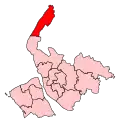 Boundary of Southport in Merseyside | |
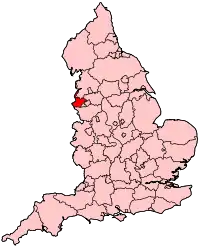 Location of Merseyside within England | |
| County | Merseyside |
| Electorate | 67,803 (December 2010)[1] |
| Major settlements | Southport |
| Current constituency | |
| Created | 1885 |
| Member of Parliament | Damien Moore (Conservative) |
| Number of members | One |
| Created from | South West Lancashire |
Boundaries

1885–1918: The Borough of Southport, the Sessional Division of Southport, and the parishes of Blundell, Great and Little Crosby, Ince, and Thornton.
1918–1983: The County Borough of Southport.
1983–present: The Metropolitan Borough of Sefton wards of Ainsdale, Birkdale, Cambridge, Dukes, Kew, Meols, and Norwood.
The constituency covers the whole town of Southport and the localities of Ainsdale, Birkdale, Blowick, Churchtown, Crossens, Highpark, Hillside, Kew, Marshside, Meols Cop, and Woodvale. It is bordered to the north by South Ribble, to the east by West Lancashire, and to the south by Sefton Central.
History
Prominent members
In the 19th century a notable representative was George Nathaniel Curzon, future Viceroy of India.
In the 20th century, outside politics, Edward Marshall Hall was a notable trial barrister (KC) and Sir John Fowler Leece Brunner was the son of the leading industrialist Sir John Tomlinson Brunner.
As a frontbencher, long-serving representative Robert Hudson was recognised at the time of World War II as a competent Minister of Agriculture and Fisheries in charge of that department, and was made, to give him a peerage, a viscount.[n 3]
Political history
The constituency has been a Liberal or Conservative seat throughout its history, and marginal for much of this, enabling it to change hands 11 times between the parties since it was created in 1885, having had nine Conservative MPs and eight Liberal or Liberal Democrat MPs in its history.
During the nadir of the Liberal Party (from the 1930s to the 1960s) the constituency became a safe Conservative seat, with absolute majorities from 1931 until 1970 inclusive.
Former Deputy Prime Minister John Prescott ran for Labour for the seat in 1966 and came in second place.
With the rise again of the Liberal Party in the early 1970s, election results proved to be close contests. The constituency changed hands in the 1987 general election, when it was taken by Ronnie Fearn of the Liberal Party for the SDP-Liberal Alliance (shortly before the two parties merged to form the Liberal Democrats). Fearn had contested the seat unsuccessfully for the Liberals throughout the 1970s.
Fearn lost the seat to the Conservatives' Matthew Banks at the 1992 election (one of the few Conservative gains at that election), only to regain it at the 1997 election. The Liberal Democrats held the seat (under John Pugh after Fearn stood down in 2001) until 2017.
In the 2016 referendum on the UK's membership of the European Union, the Metropolitan Borough of Sefton, of which the constituency is a part, voted to remain in the European Union by 51.9%.[2] Given its demography, it is estimated that Southport voted to remain by 54%.[3]
The seat was one of the eight Liberal Democrat seats that survived the national vote share collapse during the 2015 general election, despite a higher-than-average drop in the Liberal Democrats' vote share. Pugh opted not to seek re-election in the 2017 general election, in which election the seat returned to the Conservatives, the only seat the Tories gained from the Liberal Democrats in 2017 (aside from Richmond Park, which they had gained at a 2016 by-election). A resurgent Labour vote pushed the Liberal Democrats into third place for the first time since 1966 with the seat now becoming a somewhat unlikely Tory-Labour marginal, with just under 3,000 votes between the two major parties. If Labour were to win this seat at the next general election while holding its existing seats in Merseyside, it would mark the first time Labour (or indeed any party) has won every constituency in the county.
Constituency profile
Workless claimants (registered jobseekers) were in November 2012 close to the national average of 3.8%, at 4.0% of the population based on a statistical compilation by The Guardian.[4]
Members of Parliament
Elections
Elections in the 2010s
| Party | Candidate | Votes | % | ±% | |
|---|---|---|---|---|---|
| Conservative | Damien Moore | 22,914 | 47.6 | +8.9 | |
| Labour | Liz Savage | 18,767 | 39.0 | +6.4 | |
| Liberal Democrats | John Wright | 6,499 | 13.5 | −12.9 | |
| Majority | 4,147 | 8.6 | +2.5 | ||
| Turnout | 48,180 | 68.0 | -1.1 | ||
| Conservative hold | Swing | ||||
| Party | Candidate | Votes | % | ±% | |
|---|---|---|---|---|---|
| Conservative | Damien Moore | 18,541 | 38.7 | +10.7 | |
| Labour | Liz Savage | 15,627 | 32.6 | +13.4 | |
| Liberal Democrats | Sue McGuire | 12,661 | 26.4 | −4.6 | |
| UKIP | Terry Durrance | 1,127 | 2.4 | −14.5 | |
| Majority | 2,914 | 6.1 | +9.1 | ||
| Turnout | 47,956 | 69.1 | +3.6 | ||
| Conservative gain from Liberal Democrats | Swing | ||||
| Party | Candidate | Votes | % | ±% | |
|---|---|---|---|---|---|
| Liberal Democrats | John Pugh | 13,652 | 31.0 | −18.6 | |
| Conservative | Damien Moore | 12,330 | 28.0 | −7.8 | |
| Labour | Liz Savage | 8,468 | 19.2 | +9.8 | |
| UKIP | Terry Durrance | 7,429 | 16.8 | +11.7 | |
| Green | Laurence Rankin | 1,230 | 2.8 | N/A | |
| Southport Party | Jacqueline Barlow | 992 | 2.2 | N/A | |
| Majority | 1,322 | 3.0 | -10.8 | ||
| Turnout | 44,101 | 65.5 | +0.4 | ||
| Liberal Democrats hold | Swing | −5.4 | |||
| Party | Candidate | Votes | % | ±% | |
|---|---|---|---|---|---|
| Liberal Democrats | John Pugh | 21,707 | 49.6 | +3.3 | |
| Conservative | Brenda Porter | 15,683 | 35.8 | −1.2 | |
| Labour | Jim Conalty | 4,116 | 9.4 | −3.4 | |
| UKIP | Terry Durrance | 2,251 | 5.1 | +3.3 | |
| Majority | 6,024 | 13.8 | +4.5 | ||
| Turnout | 43,757 | 65.1 | +4.1 | ||
| Liberal Democrats hold | Swing | +2.2 | |||
Elections in the 2000s
| Party | Candidate | Votes | % | ±% | |
|---|---|---|---|---|---|
| Liberal Democrats | John Pugh | 19,093 | 46.3 | +2.5 | |
| Conservative | Mark S. Bigley | 15,255 | 37.0 | +0.5 | |
| Labour | Paul Brant | 5,277 | 12.8 | −3.8 | |
| UKIP | Terry Durrance | 749 | 1.8 | +0.5 | |
| Your Party | Bill Givens | 589 | 1.4 | N/A | |
| Veritas | Harry Forster | 238 | 0.6 | N/A | |
| Majority | 3,838 | 9.3 | +2.0 | ||
| Turnout | 41,201 | 61.0 | +1.4 | ||
| Liberal Democrats hold | Swing | +1.0 | |||
| Party | Candidate | Votes | % | ±% | |
|---|---|---|---|---|---|
| Liberal Democrats | John Pugh | 18,011 | 43.8 | −4.3 | |
| Conservative | Laurence Jones | 15,004 | 36.5 | +0.5 | |
| Labour | Paul Brant | 6,816 | 16.6 | +4.4 | |
| Liberal | David Green | 767 | 1.9 | +1.1 | |
| UKIP | Gerry Kelley | 555 | 1.3 | N/A | |
| Majority | 3,007 | 7.3 | -4.9 | ||
| Turnout | 41,153 | 58.6 | −13.5 | ||
| Liberal Democrats hold | Swing | ||||
Elections in the 1990s
| Party | Candidate | Votes | % | ±% | |
|---|---|---|---|---|---|
| Liberal Democrats | Ronnie Fearn | 24,356 | 48.1 | +6.6 | |
| Conservative | Matthew Banks | 18,186 | 35.9 | −11.1 | |
| Labour | Sarah Norman | 6,129 | 12.1 | +1.9 | |
| Referendum | Frank Buckle | 1,368 | 2.7 | N/A | |
| Liberal | Susan Ashton | 386 | 0.8 | N/A | |
| Natural Law | Elizabeth Lines | 93 | 0.2 | −0.1 | |
| National Democrats | Michael Middleton | 92 | 0.2 | N/A | |
| Majority | 6,170 | 12.2 | N/A | ||
| Turnout | 50,610 | 72.1 | −5.5 | ||
| Liberal Democrats gain from Conservative | Swing | +8.9 | |||
| Party | Candidate | Votes | % | ±% | |
|---|---|---|---|---|---|
| Conservative | Matthew Banks | 26,081 | 47.0 | +2.5 | |
| Liberal Democrats | Ronnie Fearn | 23,018 | 41.5 | −6.4 | |
| Labour | James King | 5,637 | 10.2 | +3.8 | |
| Green | Justin Walker | 545 | 1.0 | −0.2 | |
| Natural Law | Geoffrey Clements | 159 | 0.3 | N/A | |
| Majority | 3,063 | 5.5 | N/A | ||
| Turnout | 55,440 | 77.6 | +1.3 | ||
| Conservative gain from Liberal Democrats | Swing | +4.5 | |||
Elections in the 1980s
| Party | Candidate | Votes | % | ±% | |
|---|---|---|---|---|---|
| Liberal | Ronnie Fearn | 26,110 | 47.9 | +7.4 | |
| Conservative | Nigel Thomas | 24,261 | 44.5 | −5.9 | |
| Labour | Audrey Moore | 3,483 | 6.4 | −1.9 | |
| Green | Justin Walker | 653 | 1.2 | N/A | |
| Majority | 1,849 | 3.4 | N/A | ||
| Turnout | 54,507 | 76.3 | +3.8 | ||
| Liberal gain from Conservative | Swing | +6.7 | |||
| Party | Candidate | Votes | % | ±% | |
|---|---|---|---|---|---|
| Conservative | Ian Percival | 25,612 | 50.4 | −0.4 | |
| Liberal | Iain Brodie Browne | 20,573 | 40.5 | +2.5 | |
| Labour | Francis Brady | 4,233 | 8.3 | −2.9 | |
| Independent | Kevin Wood | 374 | 0.7 | N/A | |
| Majority | 5,039 | 9.9 | −2.9 | ||
| Turnout | 50,792 | 72.5 | −2.2 | ||
| Conservative hold | Swing | ||||
Elections in the 1970s
| Party | Candidate | Votes | % | ±% | |
|---|---|---|---|---|---|
| Conservative | Ian Percival | 25,953 | 50.8 | +3.6 | |
| Liberal | Ronnie Fearn | 19,426 | 38.0 | +2.3 | |
| Labour | I.Gari James | 5,725 | 12.8 | −4.3 | |
| Majority | 6,527 | 12.8 | +1.3 | ||
| Turnout | 51,104 | 74.7 | +1.0 | ||
| Conservative hold | Swing | ||||
| Party | Candidate | Votes | % | ±% | |
|---|---|---|---|---|---|
| Conservative | Ian Percival | 23,014 | 47.2 | ±0.0 | |
| Liberal | Ronnie Fearn | 17,387 | 35.7 | −3.9 | |
| Labour | I.Gari James | 8,323 | 17.1 | +3.9 | |
| Majority | 5,627 | 11.5 | +3.9 | ||
| Turnout | 48,724 | 73.7 | −3.7 | ||
| Conservative hold | Swing | ||||
| Party | Candidate | Votes | % | ±% | |
|---|---|---|---|---|---|
| Conservative | Ian Percival | 23,975 | 47.2 | −3.0 | |
| Liberal | Ronnie Fearn | 20,093 | 39.6 | +9.4 | |
| Labour | Peter R. Ward | 6,690 | 13.2 | −6.4 | |
| Majority | 3,882 | 7.6 | -12.8 | ||
| Turnout | 50,758 | 77.4 | +6.9 | ||
| Conservative hold | Swing | −6.2 | |||
| Party | Candidate | Votes | % | ±% | |
|---|---|---|---|---|---|
| Conservative | Ian Percival | 22,950 | 50.2 | −0.8 | |
| Liberal | Ronnie Fearn | 13,809 | 30.2 | +10.5 | |
| Labour | Bruce George | 8,950 | 19.6 | −9.6 | |
| Majority | 9,141 | 20.0 | −1.2 | ||
| Turnout | 45,709 | 70.5 | −2.2 | ||
| Conservative hold | Swing | N/A | |||
Elections in the 1960s
| Party | Candidate | Votes | % | ±% | |
|---|---|---|---|---|---|
| Conservative | Ian Percival | 22,324 | 51.0 | -0.9 | |
| Labour | John Prescott | 12,798 | 29.2 | +4.1 | |
| Liberal | C. Jack Coleman | 8,630 | 19.7 | -3.3 | |
| Majority | 9,526 | 21.8 | -4.9 | ||
| Turnout | 43,752 | 72.7 | -3.8 | ||
| Conservative hold | Swing | -2.5 | |||
| Party | Candidate | Votes | % | ±% | |
|---|---|---|---|---|---|
| Conservative | Ian Percival | 23,917 | 51.9 | -4.1 | |
| Labour | Leonard Goldwater | 11,572 | 25.1 | +4.7 | |
| Liberal | C. Jack Coleman | 10,609 | 23.0 | -0.5 | |
| Majority | 12,345 | 26.7 | -5.8 | ||
| Turnout | 46,098 | 76.5 | -0.3 | ||
| Conservative hold | Swing | -4.4 | |||
Elections in the 1950s
| Party | Candidate | Votes | % | ±% | |
|---|---|---|---|---|---|
| Conservative | Ian Percival | 26,905 | 56.0 | -14.2 | |
| Liberal | Sam Goldberg | 11,292 | 23.5 | +23.5 | |
| Labour | Charles W Hadfield | 9,805 | 20.4 | -9.4 | |
| Majority | 15,613 | 32.5 | -8.0 | ||
| Turnout | 48,002 | 76.8 | +8.0 | ||
| Conservative hold | Swing | ||||
| Party | Candidate | Votes | % | ±% | |
|---|---|---|---|---|---|
| Conservative | Roger Fleetwood-Hesketh | 30,268 | 70.2 | +10.0 | |
| Labour | Peter Cameron | 12,827 | 29.8 | +5.0 | |
| Majority | 17,441 | 40.4 | +4.9 | ||
| Turnout | 43,095 | 68.8 | -8.9 | ||
| Conservative hold | Swing | +2.5 | |||
| Party | Candidate | Votes | % | ±% | |
|---|---|---|---|---|---|
| Conservative | Roger Fleetwood-Hesketh | 24,589 | 62.0 | +1.8 | |
| Labour | Alan Lever Tillotson | 11,310 | 28.5 | +3.7 | |
| Liberal | Hubert Bentliff | 3,776 | 9.5 | -5.5 | |
| Majority | 13,279 | 33.5 | -1.8 | ||
| Turnout | 39,675 | ||||
| Conservative hold | Swing | ||||
| Party | Candidate | Votes | % | ±% | |
|---|---|---|---|---|---|
| Conservative | Robert Hudson | 30,388 | 60.2 | +3.9 | |
| Labour | H Owen Ellis | 12,535 | 24.8 | -2.0 | |
| Liberal | Hubert Bentliff | 7,576 | 15.0 | -1.9 | |
| Majority | 17,853 | 35.4 | +5.9 | ||
| Turnout | 50,499 | 77.7 | -4.1 | ||
| Conservative hold | Swing | +2.9 | |||
| Party | Candidate | Votes | % | ±% | |
|---|---|---|---|---|---|
| Conservative | Robert Hudson | 29,766 | 56.3 | +3.6 | |
| Labour | J P Bonney | 14,159 | 26.8 | +0.0 | |
| Liberal | Harry Ellington | 8,933 | 16.9 | -3.6 | |
| Majority | 15,607 | 29.5 | +3.6 | ||
| Turnout | 52,858 | 81.8 | +7.6 | ||
| Conservative hold | Swing | +1.8 | |||
Elections in the 1940s
| Party | Candidate | Votes | % | ±% | |
|---|---|---|---|---|---|
| Conservative | Robert Hudson | 26,792 | 52.7 | -19.5 | |
| Labour | William Hamling | 13,596 | 26.8 | -1.0 | |
| Liberal | Robert Martin | 10,404 | 20.5 | ||
| Majority | 13,196 | 25.9 | -18.5 | ||
| Turnout | 50,792 | 74.2 | +3.3 | ||
| Conservative hold | Swing | ||||
Elections in the 1930s
| Party | Candidate | Votes | % | ±% | |
|---|---|---|---|---|---|
| Conservative | Robert Hudson | 29,652 | 72.2 | +3.8 | |
| Labour | Robert Carrington-Willis | 11,419 | 27.8 | ||
| Majority | 18,233 | 44.4 | +7.6 | ||
| Turnout | 41,071 | 70.9 | -8.8 | ||
| Conservative hold | Swing | ||||
| Party | Candidate | Votes | % | ±% | |
|---|---|---|---|---|---|
| Conservative | Robert Hudson | 30,307 | 68.4 | +20.1 | |
| Liberal | Moelwyn Hughes | 13,983 | 31.6 | -7.8 | |
| Majority | 16,324 | 36.8 | +27.9 | ||
| Turnout | 44,290 | 79.7 | +0.1 | ||
| Conservative hold | Swing | ||||
Elections in the 1920s
| Party | Candidate | Votes | % | ±% | |
|---|---|---|---|---|---|
| Unionist | Godfrey Dalrymple-White | 21,161 | 48.3 | -12.7 | |
| Liberal | Cecil Ramage | 17,220 | 39.4 | +0.4 | |
| Labour | Arthur Leonard Williams | 5,380 | 12.3 | n/a | |
| Majority | 3,941 | 8.9 | -13.1 | ||
| Turnout | 43,761 | 79.6 | +1.2 | ||
| Unionist hold | Swing | -6.6 | |||
| Party | Candidate | Votes | % | ±% | |
|---|---|---|---|---|---|
| Unionist | Godfrey Dalrymple-White | 17,430 | 61.0 | +12.8 | |
| Liberal | John Brunner | 11,158 | 39.0 | -12.8 | |
| Majority | 6,272 | 22.0 | |||
| Turnout | 28,588 | 78.7 | +2.8 | ||
| Unionist gain from Liberal | Swing | ||||
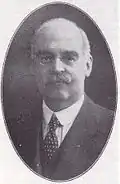
| Party | Candidate | Votes | % | ±% | |
|---|---|---|---|---|---|
| Liberal | John Brunner | 13,704 | 51.8 | +5.0 | |
| Unionist | Thomas Comyn-Platt | 12,776 | 48.2 | -5.0 | |
| Majority | 928 | 3.6 | |||
| Turnout | 26,480 | 75.9 | -0.4 | ||
| Liberal gain from Unionist | Swing | +5.0 | |||
| Party | Candidate | Votes | % | ±% | |
|---|---|---|---|---|---|
| Unionist | Godfrey Dalrymple-White | 13,733 | 53.2 | -18.8 | |
| Liberal | John Brunner | 12,068 | 46.8 | n/a | |
| Majority | 1,665 | 6.4 | -37.6 | ||
| Turnout | 25,801 | 76.3 | +14.7 | ||
| Unionist hold | Swing | ||||
Elections in the 1910s
| Party | Candidate | Votes | % | ±% | |
|---|---|---|---|---|---|
| C | Unionist | Godfrey Dalrymple-White | 14,707 | 72.0 | +19.7 |
| Labour | Arthur Greenwood | 5,727 | 28.0 | n/a | |
| Majority | 8,980 | 44.0 | +39.4 | ||
| Turnout | 20,434 | 61.6 | -24.0 | ||
| Unionist hold | Swing | ||||
| C indicates candidate endorsed by the coalition government. | |||||
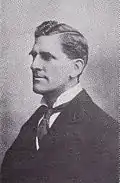
| Party | Candidate | Votes | % | ±% | |
|---|---|---|---|---|---|
| Conservative | Godfrey Dalrymple-White | 7,467 | 52.3 | +0.9 | |
| Liberal | H. B. D. Woodcock | 6,798 | 47.7 | -0.9 | |
| Majority | 669 | 4.6 | +1.8 | ||
| Turnout | 14,265 | 85.6 | -3.6 | ||
| Conservative hold | Swing | ||||
| Party | Candidate | Votes | % | ±% | |
|---|---|---|---|---|---|
| Conservative | Godfrey Dalrymple-White | 7,637 | 51.4 | +2.3 | |
| Liberal | Maurice de Forest | 7,218 | 48.6 | -2.3 | |
| Majority | 419 | 2.8 | |||
| Turnout | 14,855 | 89.2 | +1.9 | ||
| Conservative gain from Liberal | Swing | ||||
Elections in the 1900s
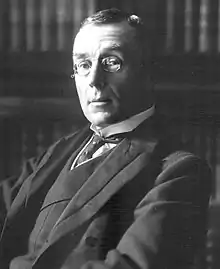
| Party | Candidate | Votes | % | ±% | |
|---|---|---|---|---|---|
| Liberal | John Astbury | 6,607 | 50.9 | +1.9 | |
| Conservative | Edward Marshall Hall | 6,367 | 49.1 | -1.9 | |
| Majority | 240 | 1.8 | N/A | ||
| Turnout | 12,974 | 87.3 | +5.0 | ||
| Registered electors | 14,854 | ||||
| Liberal gain from Conservative | Swing | +1.9 | |||
| Party | Candidate | Votes | % | ±% | |
|---|---|---|---|---|---|
| Conservative | Edward Marshall Hall | 5,522 | 51.0 | −3.0 | |
| Liberal | George Augustus Pilkington | 5,313 | 49.0 | +3.0 | |
| Majority | 209 | 2.0 | −6.0 | ||
| Turnout | 10,835 | 82.3 | −0.7 | ||
| Registered electors | 13,164 | ||||
| Conservative hold | Swing | −3.0 | |||
Elections in the 1890s
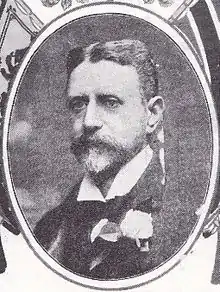
| Party | Candidate | Votes | % | ±% | |
|---|---|---|---|---|---|
| Liberal | George Augustus Pilkington | 5,635 | 52.7 | +6.7 | |
| Conservative | Charles Balfour | 5,052 | 47.3 | −6.7 | |
| Majority | 583 | 5.4 | N/A | ||
| Turnout | 10,687 | 84.4 | +1.4 | ||
| Registered electors | 12,656 | ||||
| Liberal gain from Conservative | Swing | +6.7 | |||
- Caused by Naylor-Leyland's death.
| Party | Candidate | Votes | % | ±% | |
|---|---|---|---|---|---|
| Liberal | Herbert Naylor-Leyland | 5,100 | 51.4 | +5.4 | |
| Conservative | Edward Bootle-Wilbraham | 4,828 | 48.6 | -5.4 | |
| Majority | 272 | 2.8 | N/A | ||
| Turnout | 9,928 | 80.1 | -2.9 | ||
| Registered electors | 12,395 | ||||
| Liberal gain from Conservative | Swing | +5.4 | |||
- Caused by Curzon's appointment as Viceroy and Governor-General of India.
| Party | Candidate | Votes | % | ±% | |
|---|---|---|---|---|---|
| Conservative | George Curzon | 5,162 | 54.0 | +0.6 | |
| Liberal | Herbert Naylor-Leyland | 4,399 | 46.0 | -0.6 | |
| Majority | 763 | 8.0 | +1.2 | ||
| Turnout | 9,561 | 83.0 | -1.6 | ||
| Registered electors | 11,523 | ||||
| Conservative hold | Swing | +0.6 | |||
| Party | Candidate | Votes | % | ±% | |
|---|---|---|---|---|---|
| Conservative | George Curzon | 4,752 | 53.4 | +0.1 | |
| Liberal | George Pollard | 4,148 | 46.6 | -0.1 | |
| Majority | 604 | 6.8 | +0.2 | ||
| Turnout | 8,900 | 84.6 | +1.8 | ||
| Registered electors | 10,514 | ||||
| Conservative hold | Swing | +0.1 | |||
Elections in the 1880s
| Party | Candidate | Votes | % | ±% | |
|---|---|---|---|---|---|
| Conservative | George Curzon | 3,723 | 53.3 | +4.4 | |
| Liberal | George Augustus Pilkington | 3,262 | 46.7 | -4.4 | |
| Majority | 461 | 6.6 | N/A | ||
| Turnout | 6,985 | 82.8 | -4.0 | ||
| Registered electors | 8,437 | ||||
| Conservative gain from Liberal | Swing | +4.4 | |||
| Party | Candidate | Votes | % | ±% | |
|---|---|---|---|---|---|
| Liberal | George Augustus Pilkington | 3,741 | 51.1 | N/A | |
| Conservative | John Edwards-Moss | 3,581 | 48.9 | N/A | |
| Majority | 160 | 2.2 | N/A | ||
| Turnout | 7,322 | 86.8 | N/A | ||
| Registered electors | 8,437 | ||||
| Liberal win (new seat) | |||||
Notes and references
- Notes
- A borough constituency (for the purposes of election expenses and type of returning officer)
- As with all constituencies, the constituency elects one Member of Parliament (MP) by the first past the post system of election at least every five years.
- This is above the usual barony in the peerage.
- References
- "Electorate Figures – Boundary Commission for England". 2011 Electorate Figures. Boundary Commission for England. 4 March 2011. Archived from the original on 6 November 2010. Retrieved 13 March 2011.
- "EU Referendum Results". BBC News. Retrieved 19 April 2017.
- "Revised estimates of Leave vote share in Westminster constituencies". Medium. 18 August 2016. Retrieved 19 April 2017.
- Unemployment claimants by constituency The Guardian
- Leigh Rayment's Historical List of MPs – Constituencies beginning with "S" (part 4)
- "Southport Parliamentary constituency". BBC News. BBC. Retrieved 25 November 2019.
- "Southport parliamentary constituency". BBC News.
- "Election Data 2015". Electoral Calculus. Archived from the original on 17 October 2015. Retrieved 17 October 2015.
- "Southport". BBC News. Retrieved 10 May 2015.
- "Election Data 2010". Electoral Calculus. Archived from the original on 26 July 2013. Retrieved 17 October 2015.
- "Election Data 2005". Electoral Calculus. Archived from the original on 15 October 2011. Retrieved 18 October 2015.
- "Election Data 2001". Electoral Calculus. Archived from the original on 15 October 2011. Retrieved 18 October 2015.
- "Election Data 1997". Electoral Calculus. Archived from the original on 15 October 2011. Retrieved 18 October 2015.
- "Election Data 1992". Electoral Calculus. Archived from the original on 15 October 2011. Retrieved 18 October 2015.
- "UK General Election results April 1992". Richard Kimber's Political Science Resources. Politics Resources. 9 April 1992. Retrieved 6 December 2010.
- "Election Data 1987". Electoral Calculus. Archived from the original on 15 October 2011. Retrieved 18 October 2015.
- "Election Data 1983". Electoral Calculus. Archived from the original on 15 October 2011. Retrieved 18 October 2015.
- Craig, FWS, ed. (1974). British Parliamentary Election Results: 1885-1918. London: Macmillan Press. ISBN 9781349022984.
Sources
- Election results, 1950 – 2005
- F. W. S. Craig, British Parliamentary Election Results 1885 – 1918
- F. W. S. Craig, British Parliamentary Election Results 1918 – 1949